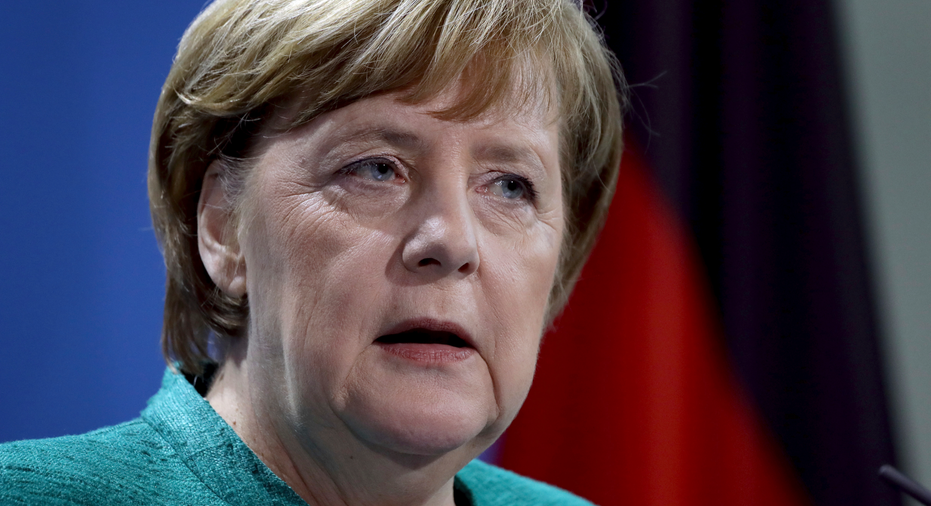Merkel still in charge of her future amid impasse in Germany

BERLIN – Angela Merkel has defied many forecasts of her looming political demise in 12 years as German chancellor. And nearly four months into post-war Germany's longest political impasse, she's likely to emerge on top again for the time being — whatever happens.
Opponents have argued that Merkel's time is nearing its end as they chew over her efforts to create a new government following September's election, in which support for her conservatives and their center-left coalition partners dropped.
Those partners, the Social Democrats, are agonizing about a decision Sunday on whether to negotiate another government with the former scientist.
"The end of Angela Merkel's time in office has begun," Kevin Kuehnert, the head of the Social Democrats' youth wing and a prominent opponent of a coalition, said recently. "The Social Democrats would do well not to extend this time in office."
The pro-business Free Democrats, who pulled the plug on Merkel's first coalition-building attempt with them and another smaller party in November, have since sought to pin much of the blame on the chancellor.
"Germany won't be able to thrive in the future with Angela Merkel's recipes of the past 12 years," deputy leader Wolfgang Kubicki said.
But opponents failed for years to find a way past Merkel and don't look close to doing so now, even if the 63-year-old is past her political peak. And there's no single obvious successor in her own party — potential rivals don't have the strength or, for now, the desire to mount an open challenge.
Merkel's popularity among voters and supporters of her own Christian Democratic Union remains remarkably solid for a leader in power so long. She built up that popularity in her early years as chancellor, sealing it with a calm response to the 2008 financial crisis and building on it by convincing many Germans that she was shielding them from the effects of the subsequent eurozone debt crisis.
"This feeling of security that she gave people is still there, in large part," said Manfred Guellner, the head of the Forsa polling agency. "That remains her strength, and is what many want in an uncertain global situation."
She still has popularity ratings that one-time mentor Helmut Kohl "could only dream of for 16 years" as chancellor, he added.
Merkel has pulled her party to the center, helping squeeze support for the Social Democrats and others. She has developed a light-touch style of leadership that often allows her to appear above everyday politics, letting others argue over contentious issues before committing to a solution.
Critics have charged that she shows too little leadership. Her second-term government, a center-right coalition with the Free Democrats, was notorious for infighting that fueled periodic speculation it would collapse.
Guellner notes that German media speculation of an imminent end to Merkel's chancellorship dates as far back as 2010. Merkel emerged from that second-term government at the 2013 election with her party's best result in more than 20 years, while her coalition partners were punished.
Merkel's decision in 2015 to allow in large numbers of asylum-seekers caused major political friction and boosted the nationalist Alternative for Germany party, which last year became the third-largest in parliament after campaigning on a shrill anti-migration and anti-Merkel message.
But while a section of the electorate is now vehemently anti-Merkel, her Union bloc was still easily the biggest party in September's election, albeit with its weakest result in decades.
That means that, whether or not the Social Democrats choose to continue the "grand coalition" of Germany's biggest parties that has governed since 2013, there still appears to be no way past Merkel for the foreseeable future. If there's no coalition, the options would be an unprecedented conservative minority government or a new election.
Merkel has made clear that she doesn't want a minority government — an arrangement that would require her to break with her consensual style and cobble together majorities on a case-by-case basis. Anti-coalition Social Democrats argue that it would be better for German politics if Merkel has to do so, and point to her past ideological flexibility.
"Mrs. Merkel has rejected all kinds of things, so I think this position could change under heavy pressure," left-wing lawmaker Hilde Mattheis said this week.
If a minority government isn't installed, a decision that would be made by Germany's president, Merkel has indicated that she would run again in a new election. So far, polls suggest that there's been little change since September, and that her bloc would again emerge on top by a distance.
The conservative-leaning Frankfurter Allgemeine Zeitung questioned this week how long "the very German wish for stability, calm and reliability that brought Merkel high popularity ratings for 12 years" will hold at bay people's desire for new faces.
"When Merkel calls it quits, a new game will begin," it said in an editorial.
It remains to be seen when that will be.
"I don't think she will get into difficulty because there is no uprising in the Union," said Guellner, the pollster. "The only thing would be if she says, 'I've had enough and I'm packing up,' but there is no sign of that."



















